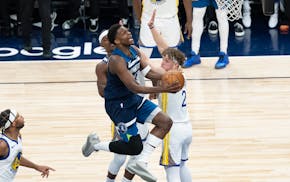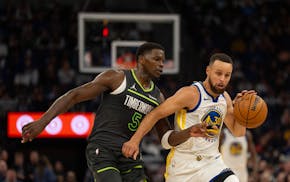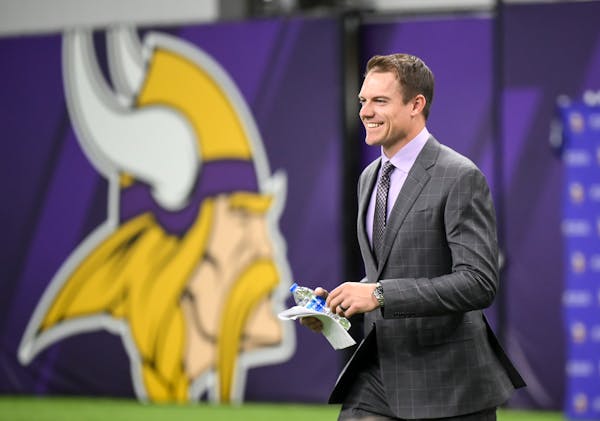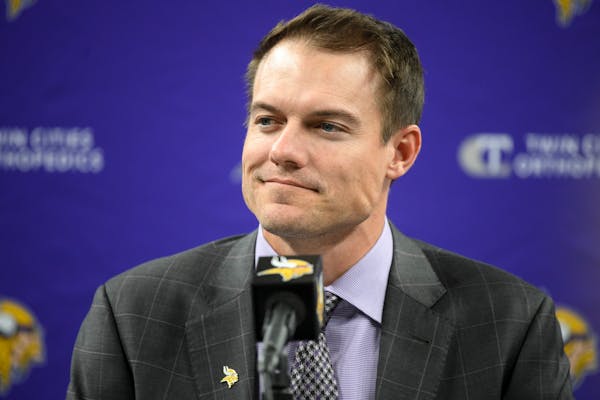Kevin O'Connell acting as his own de facto offensive coordinator means that the Vikings, for the first time in nine seasons, won't have their head coach constantly wanting to fire the offensive coordinator.
The Vikings introduced O'Connell as their head coach on Thursday afternoon, four days after he served as offensive coordinator for the Los Angeles Rams as they won the Super Bowl.
O'Connell didn't call plays for the Rams. He'll be the head coach and call plays for the Vikings.
He might have been wiser to cede play-calling to an assistant and learn to run the team as a whole during games, but Matt LaFleur has won 39 regular-season games the past three years while calling plays, so doing so isn't a proven detriment.
What's certain is that O'Connell inherits a talented offense, a problematic defense and a franchise that has employed a lot of talented people over the years without winning it all.
O'Connell was asked about incumbent quarterback Kirk Cousins, who has one year remaining on his contract, and he sounded noncommittal in one answer and committed to Cousins in another.
In reality, the Vikings have only two logical, convenient choices regarding Cousins: Let him play out his contract, or extend his deal in a way that gives the 2022 team a better chance to win.
Cousins is both problematic and far better than anyone else on the Vikings' roster or radar.
Which makes O'Connell's arrival fascinating.
Sean McVay, O'Connell's mentor, just won a Super Bowl with a quarterback who had never won a playoff game before this season.
McVay reached another Super Bowl with a quarterback who this year went 3-10-1.
One member of McVay's coaching tree, Zac Taylor, faced him in the Super Bowl, having helped Joe Burrow win a division title and three playoff games in his second season in the NFL.
Another member of McVay's coaching tree, Brandon Staley, helped Justin Herbert become the most promising NFL quarterback whose team didn't make the playoffs.
The coach/quarterback relationship is at the heart of most NFL champions and all NFL dynasties.
What's more intriguing about O'Connell's association with McVay and his coaching tree is that all of these coaches are also adept at running the ball and running a balanced offense.
So it may pass that after years of Mike Zimmer growling at various short-term offensive coordinators to "run the ball,'' the Vikings may have hired a coach who will get as much or more out of the running game than Zimmer ever did.
The Rams ran the ball effectively with three different lead backs this year. The Bengals took full advantage this season of Joe Mixon, who is similar to the Vikings' Dalvin Cook in skill set if not speed. The Chargers coaxed a remarkable season out of Austin Ekeler.
There are two kinds of quarterbacks: those who elevate and those who need to be elevated. The McVay offense can work either way.
McVay made it to one Super Bowl when his running back, Todd Gurley, was his star, and another when his best receiver, Cooper Kupp, was his star. The Rams thrived even when defenses committed to stopping Gurley or Kupp, with Kupp making winning plays down the stretch of the Super Bowl even when Cincinnati knew he was going to be the Rams' primary target.
The challenge for O'Connell will be taking an offense that was pretty good and making it great. To do so, he'll have to either make Cousins better, or make Cousins' job easier.
It's risky to read too much into quotes from an introductory news conference, but O'Connell sounded more excited about pending free-agent linebacker Anthony Barr than Cousins.
By choosing to be his own offensive coordinator and call plays, O'Connell has challenged himself to get the most out of the quarterback position. He can't, like Zimmer, blame the general manager who signed him or the coach who calls the plays.
If the apple falls close to the coaching tree, O'Connell won't need a superstar quarterback.
Which is convenient.
Souhan: If the Twins are close, the Pohlads need to go all in

Souhan: Frost's McQuigge goes to work in big playoff victory

Souhan: Twins' early struggles were unsightly but not definitive

Souhan: Pondering Ant, whose injuries are no worry but whose shooting is a large concern



